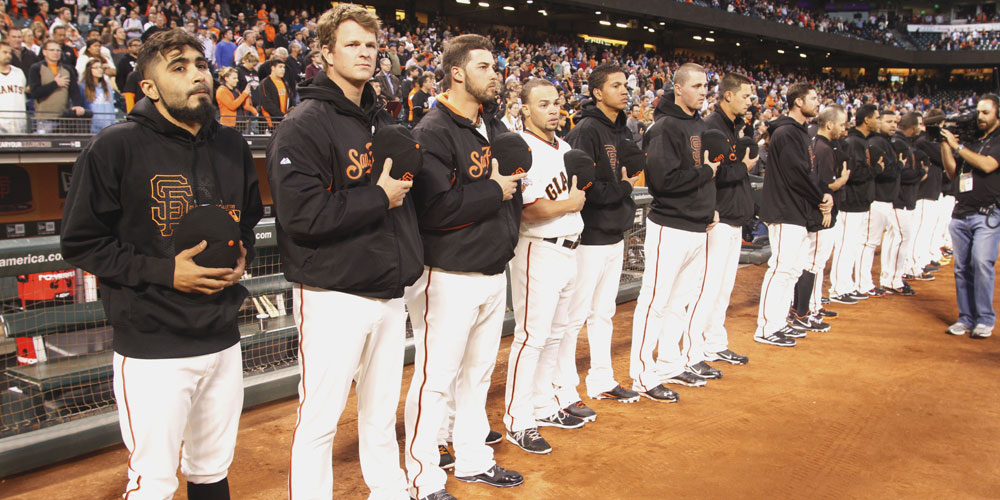
San Francisco Giants observe a moment of silence before a baseball game aganist the Los Angeles Dodgers, Thursday, Sept. 26, 2013, in San Francisco, in memory of a man who was fatally stabbed after a Dodgers-Giants game on Wednesday, not far from At&T Park. Giants’ Sergio Romo, left, and Matt Cain, second from left, hold their caps. AP
LOS ANGELES — Fans of the San Francisco Giants and Los Angeles Dodgers have sustained one of the most passionate rivalries in American sport for more than a century, starting when both called New York home and enduring through a cross-country move that placed them in California cities that — fittingly — also are rivals.
Visiting fans clad in their team’s colors could always expect ridicule, and sometimes worse, in the stands. But now, for the second time in three seasons, serious violence outside the stadium has marred the rivalry.
Two years ago, Giants fan Bryan Stow suffered permanent brain damage when he was attacked in Los Angeles. This time, Dodgers fan Jonathan Denver died after being stabbed Wednesday night in San Francisco.
The latest incident has shaken and saddened fans of both teams.
“It’s real unfortunate. It is just a game after all,” said Brian Chew, a Giants fan who attended Thursday’s game with the Dodgers.
“We have bigger purposes in life than just orange and black or blue and white,” he added, referring to the Giants’ and Dodgers’ colors.
Police say Denver, 24, was with his father, older brother and two other people a few blocks from the Giants’ ballpark when they exchanged words with some Giants fans.
“The back and forth, ‘Go Dodgers!’ ‘Go Giants!'” San Francisco Police Chief Greg Suhr said. “And it deteriorated from there.”
Denver suffered a fatal stab wound and Michael Montgomery, 21, was arrested on suspicion of homicide. A second suspect was questioned and released by police on Friday.
Montgomery’s father said his son told him he acted in self-defense after being attacked.
The killing happened more than an hour after a Giants-Dodgers game that had little consequence. Though the Giants are the reigning World Series champions, they muddled through a disappointing year while the Dodgers overcame a slow start to win their division.
Games between the two teams often have a playoff-like intensity, regardless of the teams’ positions in the standings.
Fans relish the demise of their rivals nearly as much as the success of their own team. The highlight of the Dodgers’ 1993 season came on the last game of the year when Los Angeles drubbed the Giants 12-1. The loss knocked San Francisco out of the playoffs, despite 103 victories.
The rivalry extends from the field to the stands to the streets, and has long been mixed up in identity politics.
For much of the early 20th century, the Giants were “the darlings of New York City,” favored by stockbrokers, politicians and the Broadway set, said John Thorn, Major League Baseball’s official historian. The Dodgers, meanwhile, attracted support from immigrants and others outside the mainstream and were often identified as underdogs, even as they began to field powerhouse clubs in the 1940s and 50s.
Both teams left New York following the 1957 season steeped in the joy of beating the other. Appropriate, then, that they relocated to California cities with clashing cultures.
To many a San Francisco native, Los Angeles is that place where shallow people transformed by plastic surgery dwell on whose car is better while they douse their lawns with water stolen from Northern California. If Los Angelenos think about San Francisco, it’s a foggy bastion of we’re-better-than-you snobbery clinging to a 1960s counterculture that has faded, save for the tie-dyed T-shirts of its tourist traps.
“Tensions between Northern and Southern California I think feeds into it and helps the rivalry along considerably,” said Daniel Durbin, a University of Southern California professor who studies the social and cultural impact of sports. “There’s a bit of a leap between that, though, and actual violence.”
Still, violence has been part of the rivalry. In 1938, Brooklyn Dodgers fan Robert Joyce shot and killed a fellow bar patron and bartender after an extended “ribbing” by Giants fans.
The rivalry produced one of the most infamous on-field confrontations in Major League Baseball history in 1965. While batting, Giants ace Juan Marichal thought Dodgers catcher Johnny Roseboro was trying to hit him when he threw the ball back to the mound. Marichal clubbed Roseboro in the head with a bat, sparking an extended, bench-clearing brawl. Roseboro wasn’t seriously hurt.
In 1981, a year when the Dodgers won the World Series and the Giants were also-rans, Los Angeles outfielder Reggie Smith went into the stands at San Francisco’s Candlestick Park to confront a heckling Giants fan.
After the Giants won the World Series in 2010, tensions were high when the Dodgers opened the 2011 season at home against San Francisco. Stow was attacked while walking to the stadium parking lot after the game and hit his head on the pavement.
Olivia Massaro and Aaron Vega were among the fans at Thursday’s Giants-Dodgers game, which included a moment of silence for Denver. They had different rooting interests — Massaro wore a Giants cap and Vega a Dodgers jersey — but agreed the violence was senseless.
“Sports are supposed to be something that brings people together, “Massaro said.

